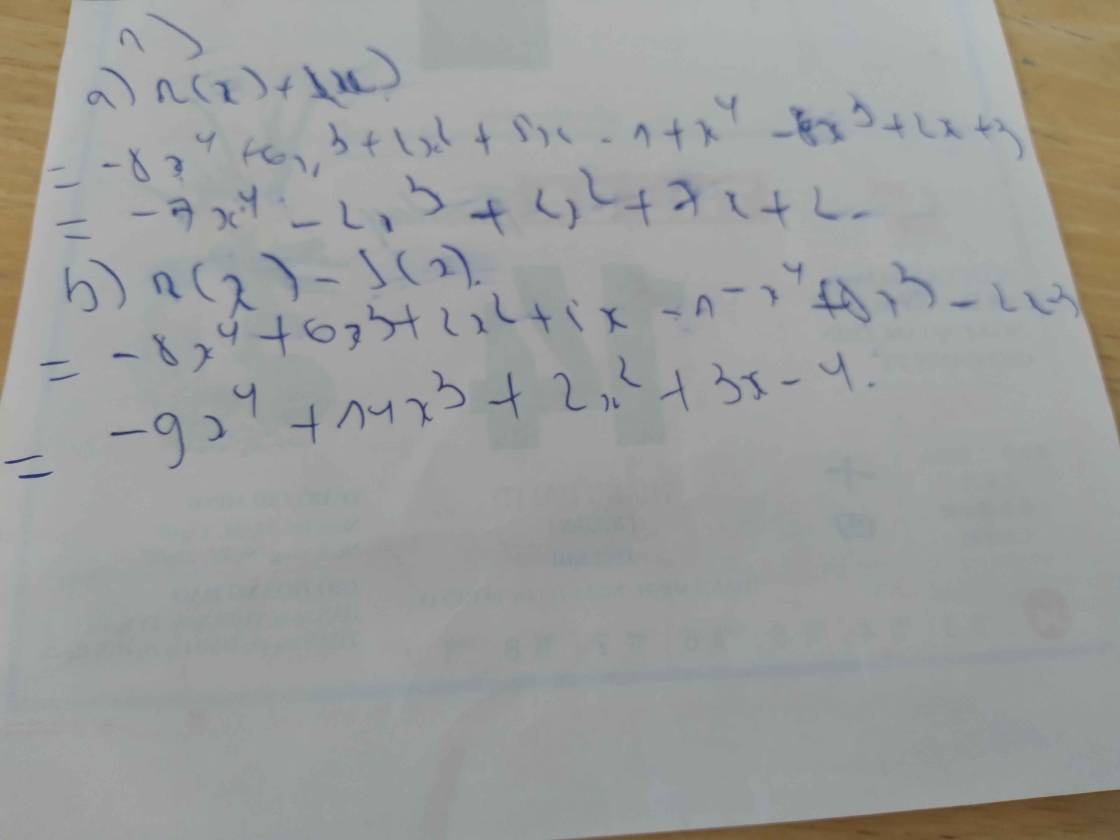13-(3.x^2+5x-8).(2x-1)=(-2.x^2-3.x+1).(x+3/8).6.x

Những câu hỏi liên quan
Bài 4: Tìm x, biết:
a) 3(2x – 3) + 2(2 – x) = –3 ; b) x(5 – 2x) + 2x(x – 1) = 13 ;
c) 5x(x – 1) – (x + 2)(5x – 7) = 6 ; d) 3x(2x + 3) – (2x + 5)(3x – 2) = 8 ;
e) 2(5x – 8) – 3(4x – 5) = 4(3x – 4) + 11; f) 2x(6x – 2x 2 ) + 3x 2 (x – 4) = 8.
\(a,3\left(2x-3\right)+2\left(2-x\right)=-3\\ \Leftrightarrow6x-9+4-2x=-3\\ \Leftrightarrow4x=2\\ \Leftrightarrow x=\dfrac{1}{2}\\ b,x\left(5-2x\right)+2x\left(x-1\right)=13\\ \Leftrightarrow5x-2x^2+2x^2-2x=13\\ \Leftrightarrow3x=13\\ \Leftrightarrow x=\dfrac{13}{3}\\ c,5x\left(x-1\right)-\left(x+2\right)\left(5x-7\right)=6\\ \Leftrightarrow5x^2-5x-5x^2-3x+14=6\\ \Leftrightarrow-8x=-8\\ \Leftrightarrow x=1\\ d,3x\left(2x+3\right)-\left(2x+5\right)\left(3x-2\right)=8\\ \Leftrightarrow6x^2+9x-6x^2-11x+10=8\\ \Leftrightarrow-2x=-2\\ \Leftrightarrow x=1\)
\(e,2\left(5x-8\right)-3\left(4x-5\right)=4\left(3x-4\right)+11\\ \Leftrightarrow10x-16-12x+15=12x-16+11\\ \Leftrightarrow-14x=-4\\ \Leftrightarrow x=\dfrac{2}{7}\\ f,2x\left(6x-2x^2\right)+3x^2\left(x-4\right)=8\\ \Leftrightarrow12x^2-4x^3+3x^3-12x^2=8\\ \Leftrightarrow-x^3-8=0\\ \Leftrightarrow-\left(x^3+8\right)=0\\ \Leftrightarrow-\left(x+2\right)\left(x^2-2x+4\right)=0\\ \Leftrightarrow\left[{}\begin{matrix}x=-2\\x\in\varnothing\left(x^2-2x+4=\left(x-1\right)^2+3>0\right)\end{matrix}\right.\)
Đúng 3
Bình luận (0)
Bài 4:
a: Ta có: \(3\left(2x-3\right)-2\left(x-2\right)=-3\)
\(\Leftrightarrow6x-9-2x+4=-3\)
\(\Leftrightarrow4x=2\)
hay \(x=\dfrac{1}{2}\)
b: Ta có: \(x\left(5-2x\right)+2x\left(x-1\right)=13\)
\(\Leftrightarrow5x-2x^2+2x^2-2x=13\)
\(\Leftrightarrow3x=13\)
hay \(x=\dfrac{13}{3}\)
c: Ta có: \(5x\left(x-1\right)-\left(x+2\right)\left(5x-7\right)=6\)
\(\Leftrightarrow5x^2-5x-5x^2+7x-10x+14=6\)
\(\Leftrightarrow-8x=-8\)
hay x=1
Đúng 0
Bình luận (0)
a/ \(3\left(2x-3\right)+2\left(2-x\right)=-3\)
\(\Leftrightarrow6x-9+4-2x=-3\)
\(\Leftrightarrow4x=2\)
\(\Leftrightarrow x=\dfrac{1}{2}\)
Vậy: \(x=\dfrac{1}{2}\)
===========
b/ \(x\left(5-2x\right)+2x\left(x-1\right)=13\)
\(\Leftrightarrow5x-2x^2+2x^2-2x=13\)
\(\Leftrightarrow3x=13\)
\(\Leftrightarrow x=\dfrac{13}{3}\)
Vậy: \(x=\dfrac{13}{3}\)
==========
c/ \(5x\left(x-1\right)-\left(x+2\right)\left(5x-7\right)=6\)
\(\Leftrightarrow5x^2-5x-5x^2+7x-10x+14=6\)
\(\Leftrightarrow-8x=-8\)
\(\Leftrightarrow x=1\)
Vậy: \(x=1\)
==========
d/ \(3x\left(2x+3\right)-\left(2x+5\right)\left(3x-2\right)=8\)
\(\Leftrightarrow6x^2+9x-6x^2+4x-15x+10=8\)
\(\Leftrightarrow-2x=-2\)
\(\Leftrightarrow x=1\)
Vậy: \(x=1\)
==========
e/ \(2\left(5x-8\right)-3\left(4x-5\right)=4\left(3x-4\right)+11\)
\(\Leftrightarrow10x-16-12x+15=12x-16+11\)
\(\Leftrightarrow-14x=-4\)
\(\Leftrightarrow x=\dfrac{2}{7}\)
Vậy: \(x=\dfrac{2}{7}\)
==========
f/ \(2x\left(6x-2x^2\right)+3x^2\left(x-4\right)=8\)
\(\Leftrightarrow12x^2-4x^3+3x^3-12x^2=8\)
\(\Leftrightarrow-x^3=8\)
\(\Leftrightarrow x=-2\)
Vậy: \(x=-2\)
Đúng 0
Bình luận (0)
1) √(2x-1) <= 8-2x
2) √[(x+1)(4-x)] > x-2
3) √(x-2x^2+1) > 1-x
4) √(x+5) - √(x+4) > √(x+3)
5) √(5x-1) - √(x-1) > √(2x-4)
6) √(x+3) >= √(2x-8) + √(7-x)
7) √(x+2) - √(3-x) < √(5-2x)
8) √(x+1) > 3 - √(x+4)
9) √(5x-1) - √(4x-1)<= 3√x
10) { {√[2(x^2-16)]} / √(x-3) }+ √(x-3) > (7-x) / √(x-3)
Giúp mình 10 câu này với ạaa
Bạn nên viết đề bằng công thức toán và ghi đầy đủ yêu cầu đề để mọi người hiểu đề của bạn hơn nhé.
Đúng 0
Bình luận (1)
1) 5x^2 13x2) (5x^2 + 3x – 2 )^2 (4x^2 – 3x – 2 )^23) x^3 + 27 + (x + 3)(x – 9) 04) 5x(x – 2000) – x + 2000 05) 5x(x – 2) – x – 2 0 6) 4x(x + 1) 8( x + 1)7) x(x – 4) + (x – 4)^2 08) x^2 – 6x + 8 09) 9x^2 + 6x – 8 010) x^3 + x^2 + x + 1 011) x^3 - x^2 - x + 1 012) (5 – 2x)(2x + 7) 4x^2 – 2513) x(2x - 1) + 1/3 . 2/3x 014) 4(2x + 7) – 9(x + 3)^2 0GIÚP TUI ZỚI MỌI NGƯỜI OIWIII!!!
Đọc tiếp
1) 5x^2 = 13x
2) (5x^2 + 3x – 2 )^2 = (4x^2 – 3x – 2 )^2
3) x^3 + 27 + (x + 3)(x – 9) = 0
4) 5x(x – 2000) – x + 2000 = 0
5) 5x(x – 2) – x – 2 = 0
6) 4x(x + 1) = 8( x + 1)
7) x(x – 4) + (x – 4)^2 = 0
8) x^2 – 6x + 8 = 0
9) 9x^2 + 6x – 8 = 0
10) x^3 + x^2 + x + 1 = 0
11) x^3 - x^2 - x + 1 = 0
12) (5 – 2x)(2x + 7) = 4x^2 – 25
13) x(2x - 1) + 1/3 . 2/3x = 0
14) 4(2x + 7) – 9(x + 3)^2 = 0
GIÚP TUI ZỚI MỌI NGƯỜI OIWIII!!!
1,\(5x^2=13x\Leftrightarrow5x^2-13x=0\Leftrightarrow x\left(5x-13\right)=0\Leftrightarrow\orbr{\begin{cases}x=0\\x=\frac{13}{5}\end{cases}}\)
2,\(\left(5x^2+3x-2\right)^2=\left(4x^2-3x-2\right)^2\Leftrightarrow\orbr{\begin{cases}5x^2+3x-2=4x^2-3x-2\\5x^2+3x-2=-4x+3x+2\end{cases}}\)
\(\Leftrightarrow\orbr{\begin{cases}x^2+6x=0\\9x^2-4=0\end{cases}\Leftrightarrow\orbr{\begin{cases}x\left(x+6\right)=0\\\left(3x\right)^2=2^2\end{cases}\Leftrightarrow}}\orbr{\begin{cases}x=0or-6\\x=-\frac{2}{3}or\frac{2}{3}\end{cases}}\)
3,\(x^3+27+\left(x+3\right)\left(x-9\right)=0\Leftrightarrow\left(x+3\right)\left(x^2+3x+9\right)+\left(x+3\right)\left(x-9\right)=0\)
\(\Leftrightarrow\left(x+3\right)\left(x^2+3x+9+x-9\right)=0\Leftrightarrow\left(x+3\right)\left(x^2+4x\right)=0\)
\(\Leftrightarrow\orbr{\begin{cases}x+3=0\\x^2+4x=0\end{cases}\Leftrightarrow}\orbr{\begin{cases}x=-3\\x\left(x+4\right)=0\end{cases}\Leftrightarrow}\orbr{\begin{cases}x=-3\\x=0or-4\end{cases}}\)
4,\(5x\left(x-2000\right)-x+2000=0\Leftrightarrow5x\left(x-2000\right)-\left(x-2000\right)=0\)
\(\Leftrightarrow\left(x-2000\right)\left(5x-1\right)=0\Leftrightarrow\orbr{\begin{cases}x=2000\\x=\frac{1}{5}\end{cases}}\)
5,\(5x\left(x-2\right)-x+2=0\Leftrightarrow5x\left(x-2\right)-\left(x-2\right)=0\)
\(\Leftrightarrow\left(x-2\right)\left(5x-1\right)=0\Leftrightarrow\orbr{\begin{cases}x-2=0\\5x-1=0\end{cases}\Leftrightarrow}\orbr{\begin{cases}x=2\\x=\frac{1}{5}\end{cases}}\)
6,\(4x\left(x+1\right)=8\left(x+1\right)\Leftrightarrow4x\left(x+1\right)-8\left(x+1\right)=0\)
\(\Leftrightarrow\left(x+1\right)\left(4x-8\right)=0\Leftrightarrow\orbr{\begin{cases}x+1=0\\4x-8=0\end{cases}\Leftrightarrow}\orbr{\begin{cases}x=-1\\x=2\end{cases}}\)
7,\(x\left(x-4\right)+\left(x-4\right)^2=0\Leftrightarrow\left(x-4\right)\left(2x-4\right)=0\Leftrightarrow\orbr{\begin{cases}x-4=0\\2x-4=0\end{cases}}\Leftrightarrow\orbr{\begin{cases}x=4\\x=2\end{cases}}\)
tí làm nửa kia
8,\(x^2-6x+8=0\Leftrightarrow x^2-6x+9-1=0\Leftrightarrow\left(x-3\right)^2-1^2=0\)
\(\Leftrightarrow\left(x-3-1\right)\left(x-3+1\right)=0\Leftrightarrow\left(x-4\right)\left(x-2\right)=0\Leftrightarrow\orbr{\begin{cases}x-4=0\\x-2=0\end{cases}\Leftrightarrow}\orbr{\begin{cases}x=4\\x=2\end{cases}}\)
9,\(9x^2+6x-8=0\Leftrightarrow9x^2+6x+1-9=0\Leftrightarrow\left(3x+1\right)^2-3^2=0\)
\(\Leftrightarrow\left(3x+1-3\right)\left(3x+1+3\right)=0\Leftrightarrow\left(3x-2\right)\left(3x+4\right)=0\Leftrightarrow\orbr{\begin{cases}3x-2=0\\3x+4=0\end{cases}\Leftrightarrow}\orbr{\begin{cases}x=\frac{2}{3}\\x=-\frac{4}{3}\end{cases}}\)
10,\(x^3+x^2+x+1=0\Leftrightarrow\left(x+1\right)\left(x^2+1\right)=0\Leftrightarrow\orbr{\begin{cases}x+1=0\\x^2+1=0\end{cases}\Leftrightarrow}x=-1\)
11,\(x^3-x^2-x+1=0\Leftrightarrow\left(x-1\right)\left(x^2-1\right)=0\Leftrightarrow\orbr{\begin{cases}x-1=0\\x^2-1=0\end{cases}}\Leftrightarrow\orbr{\begin{cases}x=1\\x=-1\end{cases}}\)
12,\(\left(5-2x\right)\left(2x+7\right)=4x^2-25\Leftrightarrow\left(5-2x\right)\left(2x+7\right)-4x^2+25=0\)
\(\Leftrightarrow\left(5-2x\right)\left(2x+7\right)-\left(5-2x\right)\left(5+2x\right)=0\)
\(\Leftrightarrow\left(5-2x\right)\left(2x+7-5-2x\right)=0\Leftrightarrow\left(5-2x\right).2=0\Leftrightarrow5-2x=0\Leftrightarrow x=\frac{5}{2}\)
13,\(x\left(2x-1\right)+\frac{1}{3}.\frac{2}{3}x=0\Leftrightarrow x\left(2x-1\right)+\frac{2}{9}x=0\)
\(\Leftrightarrow x\left(2x-1+\frac{2}{9}\right)=0\Leftrightarrow x\left(2x-\frac{7}{9}\right)=0\Leftrightarrow\orbr{\begin{cases}x=0\\2x=\frac{7}{9}\end{cases}}\Leftrightarrow\orbr{\begin{cases}x=0\\x=\frac{7}{18}\end{cases}}\)
14,\(4\left(2x+7\right)-9\left(x+3\right)^2=0\Leftrightarrow8x+28-9x^2-54x-81=0\)
\(\Leftrightarrow-9x^2+\left(8x-54x\right)+\left(28-81\right)=0\Leftrightarrow-9x^2-46x-53=0\)
\(\Leftrightarrow9x^2+46x+53=0\)Ta có : \(\Delta'=\frac{2116}{4}-477=529-477=52\)
\(\Leftrightarrow\orbr{\begin{cases}x=\frac{-23+\sqrt{52}}{9}\\x=\frac{-23-\sqrt{52}}{9}\end{cases}}\)
14, giải các PT sau.
1, 4-(x-5)=5(x-3x)
2, 32-4(0,5y-5)=3y+2
3, 19-2(x+11)=5(2x-3)-4(5x-7)
4, 4(x+3)-7x+17=8(5x-1)+166
5, 17-14(x+1)=13-4(x+1)-5(x-3)
6, 5(x+10)2+2x=5x2-3
7, (2x-1)2+5=(2x+3)(2x-3)-x
8, 3(x-2)2+2(x+3)(x-3)=5(x+1)2
Giải PT sau:a, 3x - 7 0b, 8 - 5x 0c, 3x - 2 5x + 8d, dfrac{3x-2}{3} dfrac{1-x}{2}e, ( 5x + 1)(x - 3) 0f, (x + 1)(2x - 3) 0g, 4x(x + 3) - 5(x + 3) 0h, 8(x - 6) - 2x(6 - x) 0i, dfrac{2}{x-1} + dfrac{1}{x} dfrac{2x+5}{x^2-x}k, dfrac{3}{x+2} - dfrac{2}{x-2} dfrac{2-x}{x^2-4}m, dfrac{3}{x} - dfrac{2}{x-3} dfrac{4-x}{x^2-3}n,dfrac{3}{2x+10}+ dfrac{2x}{x^2-25} dfrac{3}{x-5}u, dfrac{2}{x+3} - dfrac{3}{x-2} dfrac{x+4}{left(x+3right)left(x-2right)}
Đọc tiếp
Giải PT sau:
a, 3x - 7 = 0
b, 8 - 5x = 0
c, 3x - 2 = 5x + 8
d, \(\dfrac{3x-2}{3}\) = \(\dfrac{1-x}{2}\)
e, ( 5x + 1)(x - 3) = 0
f, (x + 1)(2x - 3) = 0
g, 4x(x + 3) - 5(x + 3) = 0
h, 8(x - 6) - 2x(6 - x) = 0
i, \(\dfrac{2}{x-1}\) + \(\dfrac{1}{x}\) = \(\dfrac{2x+5}{x^2-x}\)
k, \(\dfrac{3}{x+2}\) - \(\dfrac{2}{x-2}\) = \(\dfrac{2-x}{x^2-4}\)
m, \(\dfrac{3}{x}\) - \(\dfrac{2}{x-3}\) = \(\dfrac{4-x}{x^2-3}\)
n,\(\dfrac{3}{2x+10}\)+ \(\dfrac{2x}{x^2-25}\) = \(\dfrac{3}{x-5}\)
u, \(\dfrac{2}{x+3}\) - \(\dfrac{3}{x-2}\) = \(\dfrac{x+4}{\left(x+3\right)\left(x-2\right)}\)
a, 3x - 7 = 0
<=> 3x = 7
<=> x = 7/3
b, 8 - 5x = 0
<=> -5x = -8
<=> x = 8/5
c, 3x - 2 = 5x + 8
<=> -2x = 10
<=> x = -5
Đúng 1
Bình luận (0)
e) Ta có: \(\left(5x+1\right)\left(x-3\right)=0\)
\(\Leftrightarrow\left[{}\begin{matrix}5x+1=0\\x-3=0\end{matrix}\right.\Leftrightarrow\left[{}\begin{matrix}5x=-1\\x=3\end{matrix}\right.\Leftrightarrow\left[{}\begin{matrix}x=-\dfrac{1}{5}\\x=3\end{matrix}\right.\)
Vậy: \(S=\left\{-\dfrac{1}{5};3\right\}\)
Đúng 2
Bình luận (0)
`a ) 3x - 7 = 0`
`\(\Leftrightarrow \) 3x = 7`
`\(\Leftrightarrow \) x = 7/3`
Vậy `S = {-7/3}`
Đúng 0
Bình luận (0)
14, giải các PT sau.
1, 4-(x-5)=5(x-3x)
2, 32-4(0,5y-5)=3y+2
3, 19-2(x+11)=5(2x-3)-4(5x-7)
4, 4(x+3)-7x+17=8(5x-1)+166
5, 17-14(x+1)=13-4(x+1)-5(x-3)
6, 5(x+10)2+2x=5x2-3
7, (2x-1)2+5=(2x+3)(2x-3)-x
8, 3(x-2)2+2(x+3)(x-3)=5(x+1)2
1. Cho hai đa thức: R(x)=-8(x^4)+6(x^3)+2(x^2)+5x-1 và S(x)=(x^4)-8(x^3)+2x+3. Tính: a) R(x)+S(x); b) R(x)-S(x). 2. Xác định bậc của hai đa thức là tổng, hiệu của: A(x)=8(x^5)+6(x^4)+2(x^2)-5x+1 và B(x)=8(x^5)+8(x^3)+2x-3.
Giải phương trình
1) 16-8x=0
2) 7x+14=0
3) 5-2x=0
4) 3x-5=7
5) 8-3x=6
6) 8=11x+6
7)-9+2x=0
8) 7x+2=0
9) 5x-6=6+2x
10) 10+2x=3x-7
11) 5x-3=16-8x
12)-7-5x=8+9x
13) 18-5x=7+3x
14) 9-7x=-4x+3
15) 11-11x=21-5x
16) 2(-7+3x)=5-(x+2)
17) 5(8+3x)+2(3x-8)=0
18) 3(2x-1)-3x+1=0
19)-4(x-3)=6x+(x-3)
20)-5-(x+3)=2-5x
20) -5-(x + 3) = 2 - 5x ⇔ -5 - x - 3 = 2 -5x ⇔ 4x = 10 ⇔ x = \(\frac{5}{2}\)
Vậy...
https://i.imgur.com/PCDykdb.jpg
1) 16 - 8x = 0 ⇔ 8(2 - x) = 0⇔ 2 - x = 0 ⇔ x = 2
Vậy phương trình có nghiệm là x = 2
Xem thêm câu trả lời
5,\(\dfrac{x^2-5x-4}{8}\)=\(\dfrac{x+1}{2}\)+\(\dfrac{x^2-10x}{9}\)
6,(x+3)(x-3)=(x-1)(9-x)
7,(x-1)\(^2\)=9(x^2+2x+1)
8,(x^2-5x+8)\(^2\)-(5x-17)\(^2\)
giup em voi a
5: \(\Leftrightarrow9\left(x^2-5x-4\right)=36\left(x+1\right)+8\left(x^2-10x\right)\)
\(\Leftrightarrow9x^2-45x-36-36x-36-8x^2+80x=0\)
\(\Leftrightarrow x^2-x-72=0\)
=>(x-9)(x+8)=0
=>x=9 hoặc x=-8
6: \(\Leftrightarrow x^2-9=9x-x^2-9+x\)
\(\Leftrightarrow2x^2-10x=0\)
=>2x(x-5)=0
=>x=0 hoặc x=5
Đúng 1
Bình luận (0)
5, <=> 9x^2 - 45x - 36 = 36x + 36 + 8x^2 - 80x
<=> x^2 - x - 72 = 0 <=> x = 9 ; x = -8
6, <=> x^2 - 9 = 9x - x^2 - 9 + x = 10x - x^2 - 9
<=> 2x^2 - 10x = 0 <=> x = 0 ; x = 5
7, <=> (x-1)^2 = (3x+3)^2
<=> (x-1-3x-3)(x-1+3x+3) = 0
<=> (-2x-4)(4x+2) = 0 <=> x = -2;x=-1/2
8, = (x^2-10x-15)(x^2-10x+25)
Đúng 0
Bình luận (2)




























